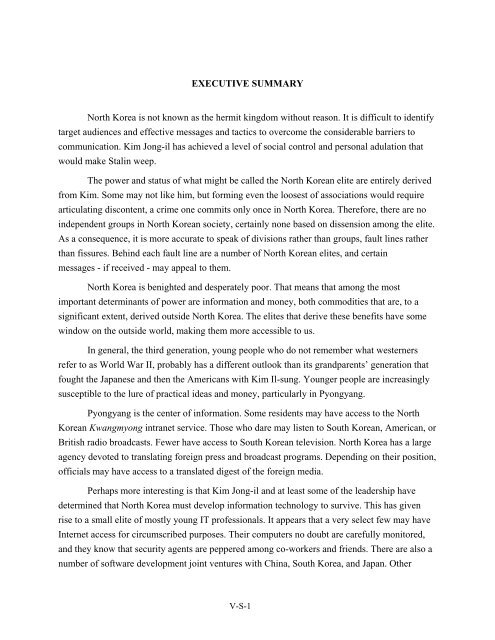North Korean Policy Elites - Defense Technical Information Center
North Korean Policy Elites - Defense Technical Information Center
North Korean Policy Elites - Defense Technical Information Center
Create successful ePaper yourself
Turn your PDF publications into a flip-book with our unique Google optimized e-Paper software.
EXECUTIVE SUMMARY<br />
<strong>North</strong> Korea is not known as the hermit kingdom without reason. It is difficult to identify<br />
target audiences and effective messages and tactics to overcome the considerable barriers to<br />
communication. Kim Jong-il has achieved a level of social control and personal adulation that<br />
would make Stalin weep.<br />
The power and status of what might be called the <strong>North</strong> <strong>Korean</strong> elite are entirely derived<br />
from Kim. Some may not like him, but forming even the loosest of associations would require<br />
articulating discontent, a crime one commits only once in <strong>North</strong> Korea. Therefore, there are no<br />
independent groups in <strong>North</strong> <strong>Korean</strong> society, certainly none based on dissension among the elite.<br />
As a consequence, it is more accurate to speak of divisions rather than groups, fault lines rather<br />
than fissures. Behind each fault line are a number of <strong>North</strong> <strong>Korean</strong> elites, and certain<br />
messages - if received - may appeal to them.<br />
<strong>North</strong> Korea is benighted and desperately poor. That means that among the most<br />
important determinants of power are information and money, both commodities that are, to a<br />
significant extent, derived outside <strong>North</strong> Korea. The elites that derive these benefits have some<br />
window on the outside world, making them more accessible to us.<br />
In general, the third generation, young people who do not remember what westerners<br />
refer to as World War II, probably has a different outlook than its grandparents’ generation that<br />
fought the Japanese and then the Americans with Kim Il-sung. Younger people are increasingly<br />
susceptible to the lure of practical ideas and money, particularly in Pyongyang.<br />
Pyongyang is the center of information. Some residents may have access to the <strong>North</strong><br />
<strong>Korean</strong> Kwangmyong intranet service. Those who dare may listen to South <strong>Korean</strong>, American, or<br />
British radio broadcasts. Fewer have access to South <strong>Korean</strong> television. <strong>North</strong> Korea has a large<br />
agency devoted to translating foreign press and broadcast programs. Depending on their position,<br />
officials may have access to a translated digest of the foreign media.<br />
Perhaps more interesting is that Kim Jong-il and at least some of the leadership have<br />
determined that <strong>North</strong> Korea must develop information technology to survive. This has given<br />
rise to a small elite of mostly young IT professionals. It appears that a very select few may have<br />
Internet access for circumscribed purposes. Their computers no doubt are carefully monitored,<br />
and they know that security agents are peppered among co-workers and friends. There are also a<br />
number of software development joint ventures with China, South Korea, and Japan. Other<br />
V-S-1













